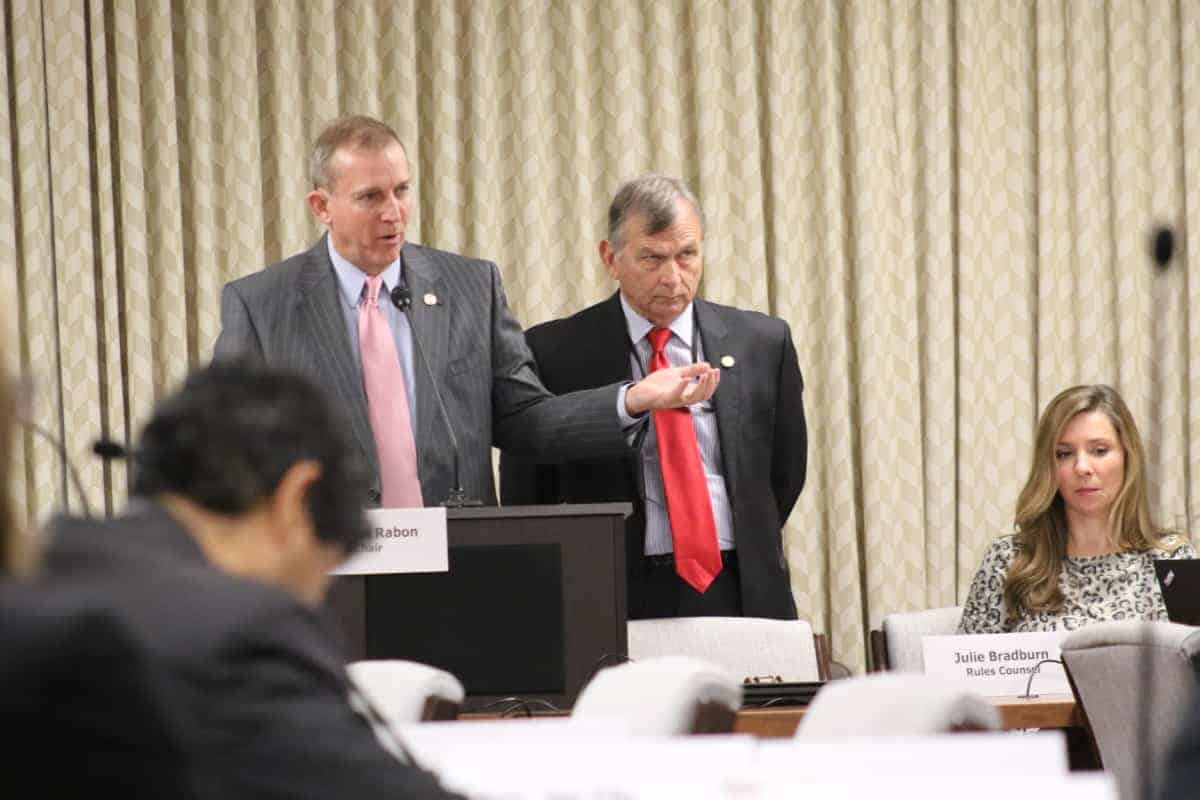Jones Street was home to a flurry of activity concerning school infrastructure spending on Tuesday, with the Senate getting closer to hearing a bill to inject $6 billion for construction and repair, Gov. Roy Cooper weighing in on his support of a competing House proposal, and Senate Democrats issuing a statement promising yet another option to be revealed this week.
The day began with the Senate rules and operations committee giving a favorable report to Senate Bill 5, called Building North Carolina’s Future, which would give local K-12 school districts, community colleges and UNC universities, and other state agencies $2 billion each over nine years for construction and building repair. SB5 was created in response to the infrastructure bond bill House Speaker Tim Moore, R-Cleveland, filed at the end of last year and which Moore has been discussing at town hall meetings in rural communities over the past month.
“I think all of us know that each of our counties are struggling with school construction needs and repairs,” Sen. Harry Brown, R-Onslow, said. “And I know the bond piece was out there. We just were looking at what we think’s a better way to handle this issue.”
Under SB5, the money would come by increasing state revenue funds that go into the State Capital and Infrastructure Fund (SCIF) from 4 to 4.5 percent. Fiscal research staff said the Department of Administration has estimated there are around $6 billion in infrastructure needs for state-owned facilities. Under Moore’s school bond plan, the state would take out debt to give $1.5 billion for new K-12 schools and about $200 million each for the UNC System and Community College System.
Proponents of SB5 say that it will get money to schools without raising debt and saddling the state with interest payments that could amount to more than 60 percent of the principal used. Proponents of the bond plan, however, say the Senate proposal is not a guarantee of money to the schools because this year’s assembly cannot bind future assemblies’ actions — like revising or stopping the funding.
Speaker Moore said this is especially concerning because school construction contracts are multi-year projects, so schools need the certainty his bond proposal provides. Rep. Jeffrey Elmore, R-Wilkes, cautioned that if a school entered a multi-year construction contract and the funding dried up under SB5, that local governments could be forced to raise taxes.
Following the favorable report for SB5 from committee in the morning, Gov. Cooper, who had already gone on record in support of the House bond plan, issued a statement likening the Senate plan to using gas money to buy a car.
“North Carolina should put a school bond to a vote so the people can decide whether to fix our old schools and build new ones,” Cooper said. “Skimming money that should go to teacher pay raises and other school funding is like using your gas money to buy a car. A successful school bond is a smarter way to do business because it locks down financing now and still leaves funding to get good teachers and principals in the classrooms.”
In response, Sen. Berger’s spokesperson Pat Ryan said: “It will cost $1.2 billion in debt interest payments to get $1.9 billion through a bond. That’s like using your gas money to start a fire. That money could be used for other needs like improving school safety, raising teacher salaries, or purchasing textbooks and other instructional supplies.”
Less than two hours after Cooper and Ryan sparred, and less than an hour after the Senate adjourned for the afternoon without SB5 going to the floor, Sen. Dan Blue, D-Wake, issued a statement saying: “State school construction needs reached more than $8 billion according to a 2016 study. Since then, various proposals have been made by legislators to address these unmet needs. Senate Democrats will file a bill this week that provides a responsible, sustainable approach to funding North Carolina’s school infrastructure needs.”
Blue, along with Sens. Kirk deViere, D-Cumberland, Michael Garrett, D-Guilford, Natasha Marcus, D-Mecklenburg and Sam Searcy, D-Wake will hold a press conference to discuss this upcoming proposal at 10 a.m. on Wednesday. It will conclude an action-packed 24 hours involving school infrastructure spending that began Tuesday morning at the Senate rules and operations committee.
In committee, Brown went into some more detail while arguing why SB5 would be the better option for getting money to schools more quickly and avoiding extra debt.
“In our proposal, you get the money out on a consistent basis that continues to grow pretty quick,” he said. “When you get near the end, again, the debt is decreasing on our existing debt, so more and more money continues to go in the pot and it makes a whole lot more sense in my mind moving forward. And also, I think one of the key pieces is, at the end of this, the state will be in great shape as far as debt goes and we’ll be able to do a whole lot of things I think if the legislature chooses to do so at that particular time.”
The bill also requires schools receiving money to meet class size requirements by using the construction funds for more space.
Several members raised questions about the method. Sen. Joyce Waddell, D-Mecklenburg, wondered if over nine years there was a way to guarantee the money would not be redirected by future committee members. Brown said there was not but said he thought “… if you pass this bill, there’s going to be a whole lot of pressure to keep this in place.”
Sen. Ralph Hise, R-Mitchell, expressed concern that local governments could use the funds irresponsibly. Capital needs like construction and repair are usually paid for by local governments.
“What are the protections in here that make sure local governments keep up their maintenance of effort for capital and construction?” Hise asked.
Blue said this bill would set a precedent that needs to be discussed in greater detail. “Are we making a conscious decision that the state is now moving to permanently assume through the use of its recurring revenue … the capital needs of local government?” he asked.
And Sen. Floyd McKissick, D-Durham, said he did not understand basing the funds off revenue and had concerns over the process of appropriating funds through legislation rather than the budget at the end of the legislative session.
“I’m wondering what the logic would be for embarking upon that course, understanding that if we began to do this incrementally, there really won’t be anything left to address when we write the budget except for recurring expenditures within the agencies of state government.”




